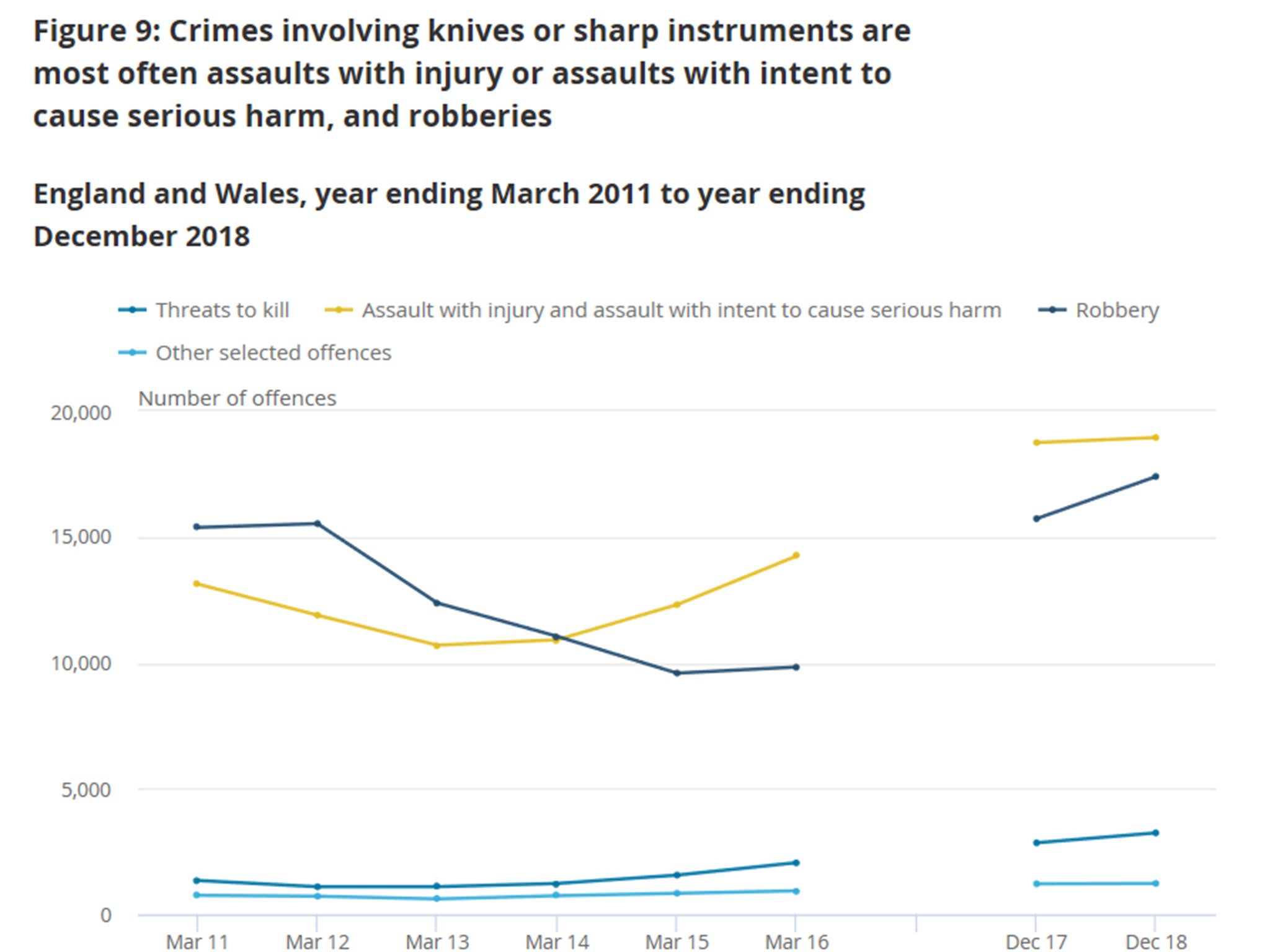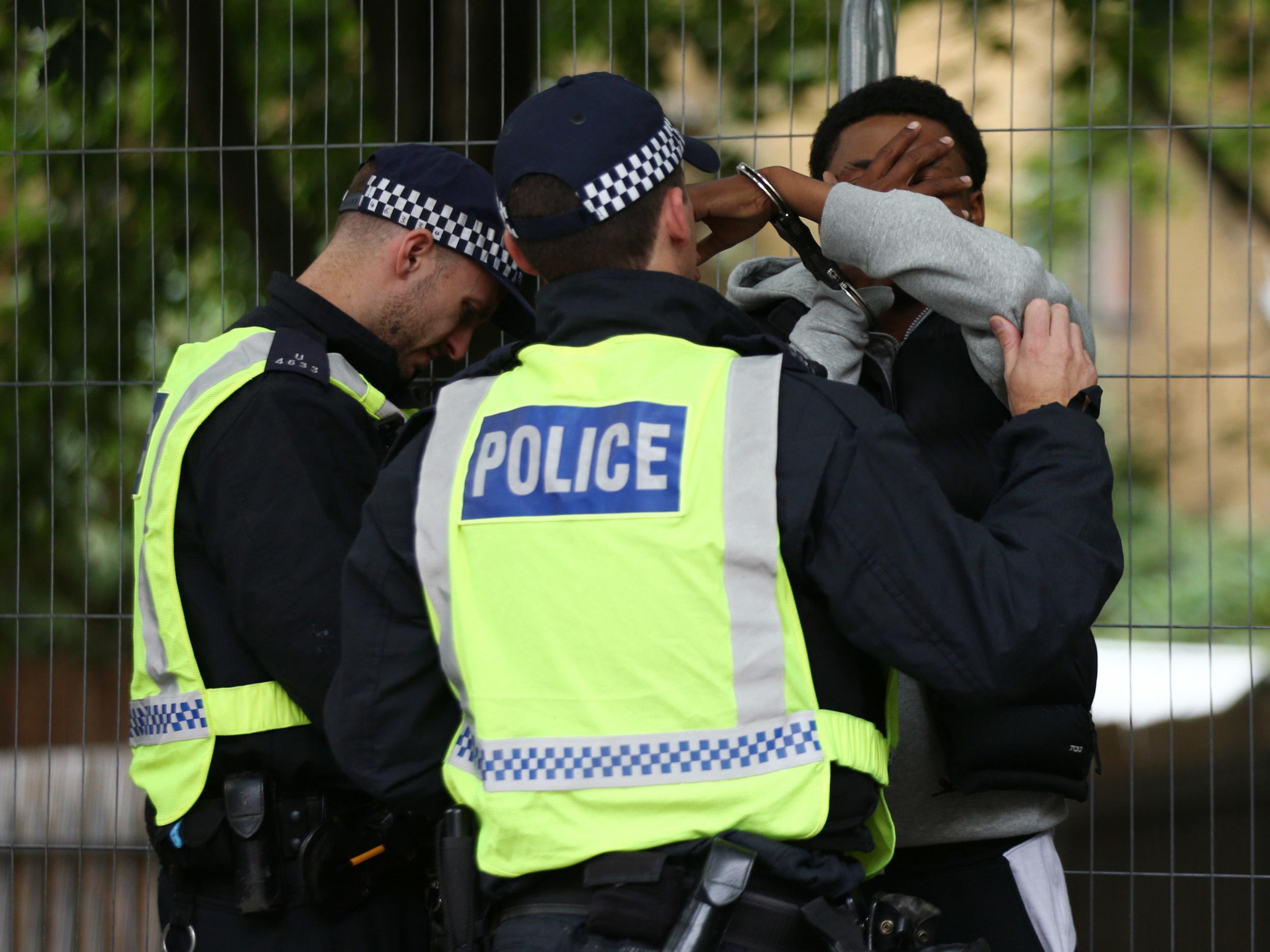Knife crime hits highest level since records began
Homicides reach highest number in more than a decade amid row over police funding
Knife crime has surged to the highest levels since records began in England and Wales, new figures reveal.
Murder and manslaughter figures also reached a 10-year high in 2018, when 732 people were killed.
Police recorded almost 44,500 offences involving knives or sharp weapons – a rise of 6 per cent – including 252 homicides and 368 attempted murders.
“The volume of knife crime offences has increased by 33 per cent since the year ending March 2011,” the Office for National Statistics said, the earliest year for which there is comparable data.
The crimes included almost 19,000 assaults, 17,400 robberies, and 3,200 threats to kill.
Knives were used in more than 400 rapes in the year to December, as well as 150 other sexual assaults.
The figures do not include knife possession, which is also rising amid warnings children as young as nine are carrying weapons in fear for their lives.
The statistics were revealed the morning after an 18-year-old was stabbed to death in Birmingham, and two men were left with life-threatening injuries in a knife attack in east London.
Seven people were stabbed in seven hours in the capital on Tuesday.
Yvette Cooper, chair of the Home Affairs Select Committee, said the increase in violent crime was “very disturbing” as separate figures showed falling numbers of arrests.
“The police are completely overstretched and crime prevention work is far too limited,” the Labour MP added.
“The Home Office and government response on knife crime and other rising crimes is still far too weak and just doesn’t match the scale of the problem.
“The problem of violent crime is going to get worse unless the government acts, and it is families and communities across the country who are paying a terrible price.”
The government has named the drugs market and social media as drivers of violent crime, and has pledged to tackle it with a “public health approach” and programmes under the Serious Violence Strategy.

But police say funding cuts that caused the loss of more than 20,000 officers since 2010 have hampered their ability to prevent and investigate stabbings, while charities have attacked slashed youth-service budgets.
As the prime minister held a knife-crime summit at Downing Street earlier this month, she was accused of holding personal responsibility for the bloodshed, after six years in charge of policing as home secretary.
“What she’s done to policing is unforgivable and she’s now seeing the impact of that,” said John Apter, chair of the Police Federation.
Police forces across the UK have started “prioritising” crime reports to save resources, and Greater Manchester Police revealed this week that 43 per cent of crimes were being “screened out”.
The National Police Chiefs’ Council said forces needed further long-term funding to deal with the raised terror threat, rising crime and more complex cases like modern slavery, child sexual exploitation and cybercrime.
Chief Constable Bill Skelly, the lead for crime recording and statistics, said: “We know that there are real rises in serious crime, such as robbery, violence and knife crime and our tactics to tackle serious violence such as targeted intelligence-led stop and search, disrupting gangs and working with local NHS trusts are showing success and we are committed to doing all we can to bring crime down.”
Diane Abbott, the shadow home secretary, called the figures “deeply troubling”.
“Ministers are in denial, refusing to accept that their cuts to police forces have had any impact either on crime levels or the ability to apprehend the criminals,” she added.
“The government is failing in one of its most basic duties, to protect its own citizens. These reckless cuts must end.”

The Metropolitan Police’s own figures showed an apparent drop in homicides, stabbings and gun crime in the capital. Knife injuries fell nearly 10 per cent from 4,732 to 4,277 and gun offences fell 6.8 per cent, according to Scotland Yard.
The policing minister Nick Hurd said the chance of being a victim of crime “remains low”.
“More recent Metropolitan Police figures suggest that action to tackle violent crime is having an impact,” he added.
“Yet too many people are still falling victim to serious violence, which is why we will continue our urgent and unprecedented action to reverse this terrible trend.
“We have given police forces additional powers and have this year put more than £1bn extra into policing, including council tax and £100m specifically for those areas worst affected by violent crime.
“But law enforcement alone is not the answer which is why our Serious Violence Strategy puts a greater focus on prevention, including by consulting on a proposed new duty to underpin a public health approach to serious violence and investing over £220m in projects to steer young people away from crime.”
The ONS statistics also showed an 11 per cent rise in robbery – both using knives and other violence – and 2 per cent rise in vehicle offences.
The separate Crime Survey of England and Wales, which represents people’s experiences of crime rather than what police record, showed an 8 per cent increase in theft and 23 per cent increase in theft from outside homes.
Alexa Bradley, deputy head of crime statistics at the ONS, said: “Robbery and vehicle offences have increased whereas burglary has decreased. Lower-volume high-harm violence involving knives has risen, whereas offences involving firearms have decreased.”

